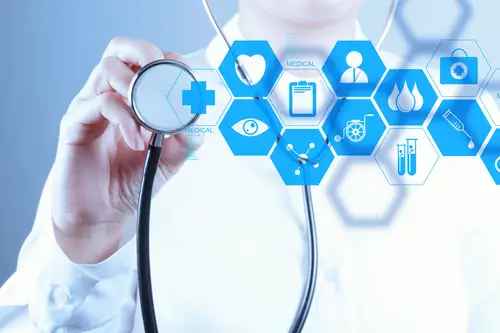In the dynamic world of healthcare, technology is not just an accessory but a game-changer. Welcome to our exploration on “Medical Technology Innovations: Transforming Healthcare Delivery and Patient Care”. This post delves into how emergent technologies are reshaping traditional medical practices and revolutionizing patient care. From telehealth services that bridge geographical barriers, artificial intelligence assisting in diagnostic procedures, to wearable tech monitoring vital health parameters – these innovations are enabling more accurate diagnoses, efficient treatments and personalized care plans like never before! Whether you’re a medical professional keen on staying abreast of cutting-edge advancements or simply curious about the future trajectory of healthcare- this insightful article is sure to pique your interest. So let’s delve deep into understanding how modern medicine isn’t solely confined within hospital walls anymore; it’s becoming embedded in our homes, our devices essentially intertwining with every aspect of our lives.
Recent Medical Innovations
Harnessing the Power of Artificial Intelligence in Healthcare
Artificial intelligence (AI) is revolutionizing the healthcare industry by enabling faster and more accurate diagnosis, personalized treatment plans, and improved patient outcomes. AI algorithms can analyze vast amounts of data to identify patterns and predict potential health risks, leading to proactive interventions and preventive care. Additionally, AI-powered tools such as virtual health assistants and telemedicine platforms are enhancing access to healthcare services, especially in remote areas. By harnessing the power of AI, healthcare providers can streamline processes, reduce costs, and ultimately improve the quality of care delivered to patients. Embracing these technological innovations is essential for transforming healthcare delivery and enhancing patient care in the 21st century.
Telemedicine: Redefining Patient-Doctor Interaction
Telemedicine is revolutionizing the way patients interact with their healthcare providers. With the advent of advanced technology, remote consultations have become a viable option for patients seeking medical advice and treatment. This mode of healthcare delivery has not only expanded access to care for individuals in remote or underserved areas but has also improved convenience and efficiency for patients with busy schedules. Through telemedicine platforms, patients can consult with healthcare professionals via video calls, phone calls, or secure messaging apps, eliminating the need for in-person visits and reducing the risk of exposure to infectious diseases.
Additionally, telemedicine allows for real-time monitoring of patients’ health conditions through wearable devices and remote sensors, providing healthcare providers with valuable data to make informed decisions about patient care. The patient-doctor interaction in telemedicine is evolving to provide a more personalized and patient-centered approach. Virtual consultations enable patients to have meaningful discussions with their healthcare providers from the comfort of their homes, fostering a sense of trust and collaboration in the decision-making process. Moreover, telemedicine promotes continuous communication between patients and doctors, leading to better adherence to treatment plans and improved health outcomes. As technology continues to advance, telemedicine holds great promise in transforming the traditional healthcare delivery model by making it more accessible, efficient, and patient-centric.
Medical Innovations – Wearable Technology and Its Impact on Personal Health Management
Wearable technology, such as smartwatches and fitness trackers, has significantly impacted personal health management. These devices provide real-time data on various health metrics, including heart rate, activity levels, and sleep patterns. By tracking and analyzing this information, individuals can gain valuable insights into their overall health and well-being. Wearable technology also enables users to set goals, monitor progress, and receive feedback on their health and fitness routines. This continuous monitoring and feedback loop can motivate individuals to make healthier choices and adopt positive behavior changes. Ultimately, wearable technology has the potential to empower individuals to take control of their own health and improve their quality of life.
The Role of Robotics in Medical Surgery and Rehabilitation
Robotics has revolutionized the field of surgery and rehabilitation, offering groundbreaking advancements in patient care and treatment delivery. In surgery, robots are increasingly being utilized to perform complex procedures with greater precision and efficiency than traditional methods. These robotic systems provide surgeons with enhanced visualization, dexterity, and control, allowing for more accurate and minimally invasive surgeries. With the ability to navigate tight spaces and perform intricate tasks, robotic surgery reduces the risk of complications, shortens recovery times, and improves patient outcomes. In rehabilitation, robotics play a crucial role in helping patients recover from injuries or surgeries by providing targeted therapy and assistance.
Robotic devices can assist patients in regaining strength, improving mobility, and restoring function through tailored exercises and activities. These devices offer real-time feedback and adjustments, ensuring that therapy is personalized to each individual’s needs and progress. By incorporating robotics into rehabilitation programs, healthcare providers can enhance the effectiveness of treatments, accelerate recovery timelines, and improve overall quality of care. Overall, the integration of robotics into surgery and rehabilitation represents a significant milestone in medical technology innovations. These advancements not only drive improvements in patient care and outcomes but also contribute to the transformation of healthcare delivery. As robotic technologies continue to evolve and become more accessible, the future of surgery and rehabilitation holds immense potential for enhancing the well-being of patients and revolutionizing the practice of medicine.
Innovation in Genomics and Precision Medicine: Tailoring Treatment to Individual Patients
Genomics and Precision Medicine have revolutionized healthcare delivery by enabling personalized treatment plans tailored to individual patients. By analyzing a patient’s genetic makeup, doctors can better understand how diseases develop and progress, as well as how different individuals respond to treatments. This knowledge allows healthcare providers to prescribe medications and therapies that are more likely to be effective for each patient, minimizing the trial-and-error approach that is often seen in traditional medicine.
Furthermore, genomics enables the identification of individuals who may be at higher risk of certain diseases, allowing for proactive interventions to prevent or manage these conditions before they become serious. The integration of genomics and precision medicine into clinical practice is reshaping the future of healthcare delivery, providing patients with targeted, personalized care that is both effective and efficient. These medical innovations are greatly reshaping the healthcare industry.

 Exploring the Latest Social Media Trends and How to Use Them
Exploring the Latest Social Media Trends and How to Use Them 10 Hidden iPhone Features You Didn’t Know Existed
10 Hidden iPhone Features You Didn’t Know Existed